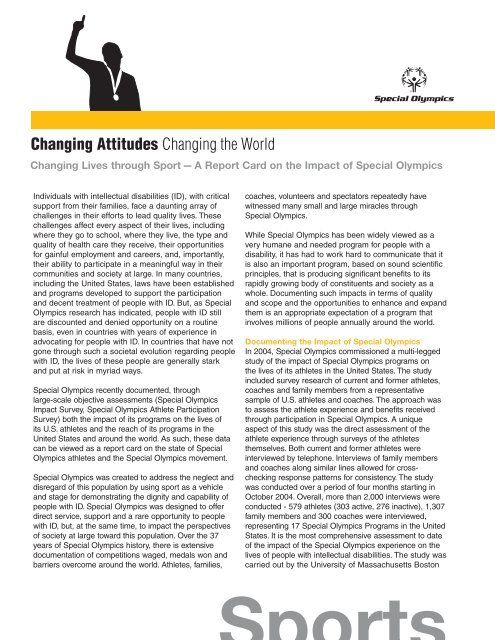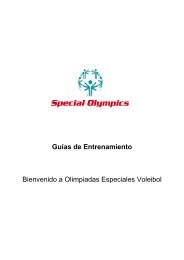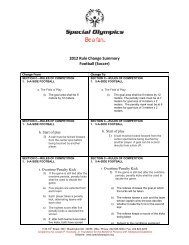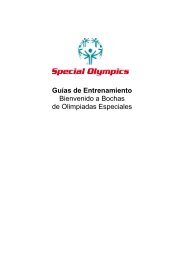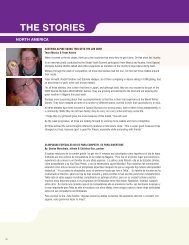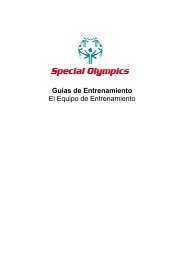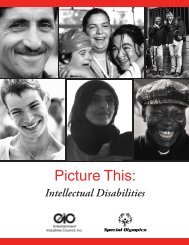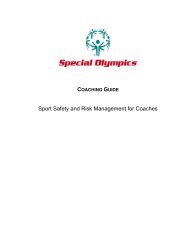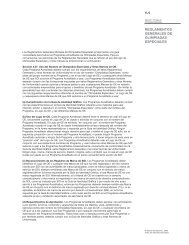Changing lives through sport â a report card on ... - Special Olympics
Changing lives through sport â a report card on ... - Special Olympics
Changing lives through sport â a report card on ... - Special Olympics
Create successful ePaper yourself
Turn your PDF publications into a flip-book with our unique Google optimized e-Paper software.
<str<strong>on</strong>g>Changing</str<strong>on</strong>g> Attitudes <str<strong>on</strong>g>Changing</str<strong>on</strong>g> the World<str<strong>on</strong>g>Changing</str<strong>on</strong>g> Lives <str<strong>on</strong>g>through</str<strong>on</strong>g> Sport — A Report Card <strong>on</strong> the Impact of <strong>Special</strong> <strong>Olympics</strong>Individuals with intellectual disabilities (ID), with criticalsupport from their families, face a daunting array ofchallenges in their efforts to lead quality <str<strong>on</strong>g>lives</str<strong>on</strong>g>. Thesechallenges affect every aspect of their <str<strong>on</strong>g>lives</str<strong>on</strong>g>, includingwhere they go to school, where they live, the type andquality of health care they receive, their opportunitiesfor gainful employment and careers, and, importantly,their ability to participate in a meaningful way in theircommunities and society at large. In many countries,including the United States, laws have been establishedand programs developed to support the participati<strong>on</strong>and decent treatment of people with ID. But, as <strong>Special</strong><strong>Olympics</strong> research has indicated, people with ID stillare discounted and denied opportunity <strong>on</strong> a routinebasis, even in countries with years of experience inadvocating for people with ID. In countries that have notg<strong>on</strong>e <str<strong>on</strong>g>through</str<strong>on</strong>g> such a societal evoluti<strong>on</strong> regarding peoplewith ID, the <str<strong>on</strong>g>lives</str<strong>on</strong>g> of these people are generally starkand put at risk in myriad ways.<strong>Special</strong> <strong>Olympics</strong> recently documented, <str<strong>on</strong>g>through</str<strong>on</strong>g>large-scale objective assessments (<strong>Special</strong> <strong>Olympics</strong>Impact Survey, <strong>Special</strong> <strong>Olympics</strong> Athlete Participati<strong>on</strong>Survey) both the impact of its programs <strong>on</strong> the <str<strong>on</strong>g>lives</str<strong>on</strong>g> ofits U.S. athletes and the reach of its programs in theUnited States and around the world. As such, these datacan be viewed as a <str<strong>on</strong>g>report</str<strong>on</strong>g> <str<strong>on</strong>g>card</str<strong>on</strong>g> <strong>on</strong> the state of <strong>Special</strong><strong>Olympics</strong> athletes and the <strong>Special</strong> <strong>Olympics</strong> movement.<strong>Special</strong> <strong>Olympics</strong> was created to address the neglect anddisregard of this populati<strong>on</strong> by using <str<strong>on</strong>g>sport</str<strong>on</strong>g> as a vehicleand stage for dem<strong>on</strong>strating the dignity and capability ofpeople with ID. <strong>Special</strong> <strong>Olympics</strong> was designed to offerdirect service, support and a rare opportunity to peoplewith ID, but, at the same time, to impact the perspectivesof society at large toward this populati<strong>on</strong>. Over the 37years of <strong>Special</strong> <strong>Olympics</strong> history, there is extensivedocumentati<strong>on</strong> of competiti<strong>on</strong>s waged, medals w<strong>on</strong> andbarriers overcome around the world. Athletes, families,coaches, volunteers and spectators repeatedly havewitnessed many small and large miracles <str<strong>on</strong>g>through</str<strong>on</strong>g><strong>Special</strong> <strong>Olympics</strong>.While <strong>Special</strong> <strong>Olympics</strong> has been widely viewed as avery humane and needed program for people with adisability, it has had to work hard to communicate that itis also an important program, based <strong>on</strong> sound scientificprinciples, that is producing significant benefits to itsrapidly growing body of c<strong>on</strong>stituents and society as awhole. Documenting such impacts in terms of qualityand scope and the opportunities to enhance and expandthem is an appropriate expectati<strong>on</strong> of a program thatinvolves milli<strong>on</strong>s of people annually around the world.Documenting the Impact of <strong>Special</strong> <strong>Olympics</strong>In 2004, <strong>Special</strong> <strong>Olympics</strong> commissi<strong>on</strong>ed a multi-leggedstudy of the impact of <strong>Special</strong> <strong>Olympics</strong> programs <strong>on</strong>the <str<strong>on</strong>g>lives</str<strong>on</strong>g> of its athletes in the United States. The studyincluded survey research of current and former athletes,coaches and family members from a representativesample of U.S. athletes and coaches. The approach wasto assess the athlete experience and benefits received<str<strong>on</strong>g>through</str<strong>on</strong>g> participati<strong>on</strong> in <strong>Special</strong> <strong>Olympics</strong>. A uniqueaspect of this study was the direct assessment of theathlete experience <str<strong>on</strong>g>through</str<strong>on</strong>g> surveys of the athletesthemselves. Both current and former athletes wereinterviewed by teleph<strong>on</strong>e. Interviews of family membersand coaches al<strong>on</strong>g similar lines allowed for crosscheckingresp<strong>on</strong>se patterns for c<strong>on</strong>sistency. The studywas c<strong>on</strong>ducted over a period of four m<strong>on</strong>ths starting inOctober 2004. Overall, more than 2,000 interviews werec<strong>on</strong>ducted - 579 athletes (303 active, 276 inactive), 1,307family members and 300 coaches were interviewed,representing 17 <strong>Special</strong> <strong>Olympics</strong> Programs in the UnitedStates. It is the most comprehensive assessment to dateof the impact of the <strong>Special</strong> <strong>Olympics</strong> experience <strong>on</strong> the<str<strong>on</strong>g>lives</str<strong>on</strong>g> of people with intellectual disabilities. The study wascarried out by the University of Massachusetts Bost<strong>on</strong>
and the University of Utah with support from the GallupOrganizati<strong>on</strong>. Dr. Gary Siperstein and Coreen Haradafrom the University of Massachusetts Bost<strong>on</strong> and Dr.Michael Hardman and Jayne Maguire from theUniversity of Utah served as investigators.Additi<strong>on</strong>ally, <strong>Special</strong> <strong>Olympics</strong> c<strong>on</strong>ducts an annualreview of athlete participati<strong>on</strong> <str<strong>on</strong>g>through</str<strong>on</strong>g>out its globalmovement. This standardized measurement effort helpstrack progress against <strong>Special</strong> <strong>Olympics</strong>’ global growthstrategy to reach 2 milli<strong>on</strong> athletes by the end of 2005.Progress toward this goal for 2004 was determinedrecently <str<strong>on</strong>g>through</str<strong>on</strong>g> the 2004 Athlete Participati<strong>on</strong> Survey.Percent %Years of Athlete Involvementin <strong>Special</strong> <strong>Olympics</strong>40353025201510The study of <strong>Special</strong> <strong>Olympics</strong>’ impact <strong>on</strong> U.S.athletes indicates that:• People with intellectual disabilities most typically cometo <strong>Special</strong> <strong>Olympics</strong> during childhood and participatefor more than a decade.• There is a successful partnership between <strong>Special</strong><strong>Olympics</strong> and schools. More than two-thirds of U.S.athletes join <strong>Special</strong> <strong>Olympics</strong> <str<strong>on</strong>g>through</str<strong>on</strong>g> a schoolbasedprogram.While <strong>Special</strong> <strong>Olympics</strong> has not relied exclusively <strong>on</strong>schools as a basis of outreach to athletes, the wellestablishedrelati<strong>on</strong>ship between community schoolsand community <strong>Special</strong> <strong>Olympics</strong> Programs reflects asound and efficient program model.055 yearsor less6–10years11–20years21 yearsor moreMore than half (52 percent) of adult <strong>Special</strong> <strong>Olympics</strong>athletes in the United States are employed, half of thosein competitive employment. While reliable data about theemployment status of the general populati<strong>on</strong> of adults withintellectual disabilities are hard to come by, values as lowas 10 percent have been cited. This suggests a str<strong>on</strong>grelati<strong>on</strong>ship between <strong>Special</strong> <strong>Olympics</strong> participati<strong>on</strong> andthe ability to be employed.Who are <strong>Special</strong> <strong>Olympics</strong> athletes?By definiti<strong>on</strong> and requirements, <strong>Special</strong> <strong>Olympics</strong> athletes areindividuals with an intellectual disability that is manifest beforeage 18 which renders the individual challenged in at least twoareas of daily functi<strong>on</strong>ing. The causes of the intellectual disabilityin athletes are quite varied. Athletes who participate fully in<strong>Special</strong> <strong>Olympics</strong> must be at least 8 years of age and there areno upper age limits. Athletes must be certified as medicallyqualified to join <strong>Special</strong> <strong>Olympics</strong> and, in the case of minors andn<strong>on</strong>-emancipated adults, have c<strong>on</strong>sent of parents or guardians.In additi<strong>on</strong> to intellectual disability, athletes also may have <strong>on</strong>e ormore additi<strong>on</strong>al disabilities (e.g., hearing or visi<strong>on</strong> impairments,spina bifida).“When given theopportunity, <strong>Special</strong><strong>Olympics</strong> athletes canspeak for themselvesand provide us withvaluable insight intotheir <str<strong>on</strong>g>lives</str<strong>on</strong>g>.”—Dr. Gary Siperstein, Ph.D.,Principal Investigator2
Initial Involvement in <strong>Special</strong> <strong>Olympics</strong>*School-Based Program 67%Community-Based Program 16%Group Home-Based Program 4%Workplace-Based Program 3%Independent/Other 10%*U.S. AthletesEmployment (Over 18)Sheltered Workshop 28%Business in Community 24%Total Employment 52%<strong>Special</strong> <strong>Olympics</strong> athletes are likeathletes everywhere• Similar to other athletes, <strong>Special</strong> <strong>Olympics</strong> athletesenjoy the social experiences that accompanyparticipati<strong>on</strong> in <str<strong>on</strong>g>sport</str<strong>on</strong>g>s training and competiti<strong>on</strong>.Teammates provide an important and valuablesource of friendship, with more than half of theathletes socializing with teammates outside of<strong>Special</strong> <strong>Olympics</strong>.• Similar to other athletes, <strong>Special</strong> <strong>Olympics</strong> athletesare motivated to participate by their enjoyment of<str<strong>on</strong>g>sport</str<strong>on</strong>g>s and by the competiti<strong>on</strong> <strong>Special</strong> <strong>Olympics</strong>provides. In an athlete’s own words, “I like to proveto myself that I can do it.”Similar to other athletes, <strong>Special</strong> <strong>Olympics</strong> athletes areserious about their <str<strong>on</strong>g>sport</str<strong>on</strong>g>s. They take an athlete oathand have led efforts to establish a coaches’ oath. Theyare not seeking sympathy or even special treatment.They have a love of <str<strong>on</strong>g>sport</str<strong>on</strong>g> and training and appreciatedevelopment of pers<strong>on</strong>al <str<strong>on</strong>g>sport</str<strong>on</strong>g>s skills; however, theystate clearly and c<strong>on</strong>sistently that the greatest rewardsthey experience are from the enjoyment of <str<strong>on</strong>g>sport</str<strong>on</strong>g>s, thesocial opportunities provided and the chance to makefriends <strong>on</strong> and off the field.Athletes’ Motives for Participati<strong>on</strong>Most Often Menti<strong>on</strong>ed Athlete Family(N=579) (N=1307)Fun/Enjoyment 97% 94%Social Aspects 96% 88%Winning/Competiti<strong>on</strong> 95% 85%“During the 2003 <strong>Special</strong><strong>Olympics</strong> World Summer Gamesin Dublin, Ireland, 38 individualathletes’ performances wouldhave bettered performances byathletes in the 2004 Internati<strong>on</strong>alSummer <strong>Olympics</strong> in Athens.”The rati<strong>on</strong>ales for participati<strong>on</strong> are similar to otherathletes at various levels and in various programs.Even those who leave <strong>Special</strong> <strong>Olympics</strong> due to lifechanges overwhelmingly express their satisfacti<strong>on</strong>with their <strong>Special</strong> <strong>Olympics</strong> experience and wouldbe willing to reestablish their participati<strong>on</strong> ifcircumstances permitted.• Participati<strong>on</strong> in <strong>Special</strong> <strong>Olympics</strong> spurs activity andpursuit of physical fitness as a lifestyle choice. Morethan half of the athlete resp<strong>on</strong>dents <str<strong>on</strong>g>report</str<strong>on</strong>g>ed three ormore hours of physical activity per week in additi<strong>on</strong> totheir participati<strong>on</strong> in <strong>Special</strong> <strong>Olympics</strong>.3
<strong>Special</strong> <strong>Olympics</strong> provides opportunities foradvancement and new experiences• Throughout their careers, <strong>Special</strong> <strong>Olympics</strong> athletestake advantage of the variety of individual and team<str<strong>on</strong>g>sport</str<strong>on</strong>g>s offered <str<strong>on</strong>g>through</str<strong>on</strong>g> the organizati<strong>on</strong> and participatein multiple <str<strong>on</strong>g>sport</str<strong>on</strong>g>s — from track and field to bowling,basketball and softball.• When participating in <strong>Special</strong> <strong>Olympics</strong>, athletes havethe opportunity to compete not <strong>on</strong>ly in their communityGames, but also can advance to regi<strong>on</strong>al, state,nati<strong>on</strong>al and even worldwide competiti<strong>on</strong>s. In fact,more than half of U.S. <strong>Special</strong> <strong>Olympics</strong> athletesadvance bey<strong>on</strong>d their local competiti<strong>on</strong>s to compete atthe regi<strong>on</strong>al and state level.It is typical for athletes, whether in <strong>Special</strong> <strong>Olympics</strong> orotherwise, to seek to reach both pers<strong>on</strong>al and teamgoals. <strong>Special</strong> <strong>Olympics</strong> athletes typically participate inseveral <str<strong>on</strong>g>sport</str<strong>on</strong>g>s at any stage of their athletic careers andoften diversify their <str<strong>on</strong>g>sport</str<strong>on</strong>g>s experience over time. Thispresents many choices and opportunities. Choice andopportunity are things most people cherish, but thatpeople with intellectual disabilities have generally beendenied in their <str<strong>on</strong>g>lives</str<strong>on</strong>g>. Additi<strong>on</strong>ally, in <strong>Special</strong> <strong>Olympics</strong>,athletes are encouraged and enabled to lead with theirideas and voices, <str<strong>on</strong>g>through</str<strong>on</strong>g> participating <strong>on</strong> boards andcommittees, working in <strong>Special</strong> <strong>Olympics</strong> Programs orserving as coaches, officials or in other volunteer roles.<strong>Special</strong> <strong>Olympics</strong> provides quality programming<str<strong>on</strong>g>through</str<strong>on</strong>g> qualified staff• The quality of the <strong>Special</strong> <strong>Olympics</strong> experience forathletes largely can be attributed to the experienceand knowledge of coaches. Almost all coaches (95percent) have received <strong>Special</strong> <strong>Olympics</strong> <str<strong>on</strong>g>sport</str<strong>on</strong>g>straining and 85 percent have had training in the areaof disabilities. Most coaches (70 percent) also haveparticipated in competitive <str<strong>on</strong>g>sport</str<strong>on</strong>g>s at some time intheir <str<strong>on</strong>g>lives</str<strong>on</strong>g>, with <strong>on</strong>e in four having competed at thecollege level.Coaches’ Training in Sports DisabilitiesTraining in CoachingGeneral <strong>Special</strong> <strong>Olympics</strong> Orientati<strong>on</strong> 95%<strong>Special</strong> <strong>Olympics</strong> Sports-Specific Training 93%Unified Sports ® Training 42%N<strong>on</strong>-<strong>Special</strong> <strong>Olympics</strong> Workshops 85%College Courses 52%• Coaches in <strong>Special</strong> <strong>Olympics</strong> know their athletes andtheir motivati<strong>on</strong>s for participating. Coaches (76 percent)share athletes’ and families’ goals for participati<strong>on</strong>,such as improved sense of self and more positivesocial experiences.• Coaches observed improvement in many areas fortheir athletes, most evidently in the areas of self-esteemand self-c<strong>on</strong>fidence, followed by improvement in <str<strong>on</strong>g>sport</str<strong>on</strong>g>skills. Coaches’ resp<strong>on</strong>ses also c<strong>on</strong>firmed families’percepti<strong>on</strong>s of improvement and athletes’ reas<strong>on</strong>sfor participati<strong>on</strong>.Percent %100908070605040302010Coaches’ Percepti<strong>on</strong>sof Athlete ImprovementFrequencyself-esteem/ social friendship health <str<strong>on</strong>g>sport</str<strong>on</strong>g>s skillsself c<strong>on</strong>fidence skillsNo ImprovementA Lot of ImprovementA Little Improvement4
What impacts does <strong>Special</strong> <strong>Olympics</strong> have <strong>on</strong>athletes and families?• The benefits of participati<strong>on</strong> in <strong>Special</strong> <strong>Olympics</strong>are substantial for its athletes. There is anoverwhelming c<strong>on</strong>sensus am<strong>on</strong>g athletes,coaches and family members that there is significantimprovement in athletes’ sense of self, social skillsand social interacti<strong>on</strong>s due to their participati<strong>on</strong> in<strong>Special</strong> <strong>Olympics</strong>.• Families of athletes with intellectual disabilities wantthe same things for their children as do other families.Parents hope that by participating in <str<strong>on</strong>g>sport</str<strong>on</strong>g>s theirchildren feel good about themselves and develop astr<strong>on</strong>g sense of self-c<strong>on</strong>fidence and self-esteem.They also see health benefits that are critical giventhe unmet health needs of this populati<strong>on</strong>.Percent %100908070605040302010Family Percepti<strong>on</strong>sof Athlete Improvementself-esteem/ social friendship health <str<strong>on</strong>g>sport</str<strong>on</strong>g>s skillsself c<strong>on</strong>fidence skillsNo ImprovementA Little Improvement<strong>Special</strong> <strong>Olympics</strong> works toward providing lifel<strong>on</strong>g <str<strong>on</strong>g>sport</str<strong>on</strong>g>sexperience for its participants. As an organizati<strong>on</strong>, itc<strong>on</strong>tinues to shape itself according to the changingdevelopmental needs of its athletes as they transiti<strong>on</strong><str<strong>on</strong>g>through</str<strong>on</strong>g> childhood, adolescence and adulthood (forexample, a Young Athletes program for individualsages 2–7 currently is being pilot tested).<strong>Special</strong> <strong>Olympics</strong> c<strong>on</strong>tinues to work at bringing thepositive experiences it has offered to individuals withintellectual disabilities in the United States to those<str<strong>on</strong>g>through</str<strong>on</strong>g>out the world who otherwise would not be giventhese same opportunities. <strong>Special</strong> <strong>Olympics</strong> plans <strong>on</strong>extending the study of its impact <strong>on</strong> athletes bey<strong>on</strong>dthe United States to Europe and China during 2005–2006.Policy Implicati<strong>on</strong>sDem<strong>on</strong>strating the positive impacts of any program <strong>on</strong>its intended beneficiaries, while also expanding serviceto more and more people, are hallmarks of effectiveprogramming. In the <strong>Special</strong> <strong>Olympics</strong> Impact Survey,we see that <strong>Special</strong> <strong>Olympics</strong> has enabled athletes t<strong>on</strong>ot <strong>on</strong>ly train for <str<strong>on</strong>g>sport</str<strong>on</strong>g>ing events, but also train for life.The fact that service expansi<strong>on</strong>s are taking place mostrapidly outside the United States means that someof the neediest populati<strong>on</strong>s in the world are nowbeing reached.Through their voices, U.S. <strong>Special</strong> <strong>Olympics</strong> athleteshave provided <strong>Special</strong> <strong>Olympics</strong> with a very positive<str<strong>on</strong>g>report</str<strong>on</strong>g> <str<strong>on</strong>g>card</str<strong>on</strong>g> <strong>on</strong> the impact that <strong>Special</strong> <strong>Olympics</strong> has <strong>on</strong>their <str<strong>on</strong>g>lives</str<strong>on</strong>g>. Combined with insights from family membersand coaches, this represents a very str<strong>on</strong>g validati<strong>on</strong> of<strong>Special</strong> <strong>Olympics</strong> as a service provider and amovement. As proven by the executi<strong>on</strong> of this study,research c<strong>on</strong>ducted with direct input of people withintellectual disabilities is both possible and informative.A Lot of Improvement5
The evidence from the <strong>Special</strong> <strong>Olympics</strong> Impact Studyclearly illustrates that <strong>Special</strong> <strong>Olympics</strong> enables peoplewith intellectual disabilities to dem<strong>on</strong>strate and experience<str<strong>on</strong>g>sport</str<strong>on</strong>g>s competence and suggests that gains in selfc<strong>on</strong>fidence,self-esteem, employment and socializati<strong>on</strong>can carry bey<strong>on</strong>d <strong>Special</strong> <strong>Olympics</strong>.In 2004, <strong>Special</strong> <strong>Olympics</strong> served more than 1.73 milli<strong>on</strong>athletes in 150 countries (and all U.S. states). This reflectsmore than 76 percent growth over a four-year-period,notwithstanding the significant challenges created forprofit and n<strong>on</strong>profit organizati<strong>on</strong>s post “9–11.” However,given <str<strong>on</strong>g>report</str<strong>on</strong>g>ed estimates of as high as 6 milli<strong>on</strong> peoplewith ID in the United States and the fact that the benefitsrealized <str<strong>on</strong>g>through</str<strong>on</strong>g> <strong>Special</strong> <strong>Olympics</strong> have reached <strong>on</strong>ly512,804 people with ID in that country, much more canbe d<strong>on</strong>e. Globally, up to 170 milli<strong>on</strong> people are <str<strong>on</strong>g>report</str<strong>on</strong>g>edto have intellectual disabilities.For the benefits of <strong>Special</strong> <strong>Olympics</strong> to be sustained andfurther extended, additi<strong>on</strong>al support will be required frommultiple sources, including government and the privatesector, as well as organizati<strong>on</strong>s. <strong>Special</strong> <strong>Olympics</strong>opportunities can <strong>on</strong>ly grow if resources permit, includingan adequate supply of coaches and volunteers.In its c<strong>on</strong>tinuing efforts to grow <strong>Special</strong> <strong>Olympics</strong> globally,<strong>Special</strong> <strong>Olympics</strong> is committed to assuring the qualityand c<strong>on</strong>sistency of its programs and the satisfacti<strong>on</strong> of itscustomers (athletes, families) and its key volunteers,including coaches.ReferencesFarrell, R. J., Crocker, P. R. E., McD<strong>on</strong>ough, M. H., &Sedgwick, W. A. (2004). The driving force: Motivati<strong>on</strong> in<strong>Special</strong> Olympians. Adapted Physical Activity Quarterly,21(2), 153–166.Gill, D. L., Gross, J. B., & Huddlest<strong>on</strong>, S. (1983).Participati<strong>on</strong> motivati<strong>on</strong> in youth <str<strong>on</strong>g>sport</str<strong>on</strong>g>s. Internati<strong>on</strong>alJournal of Sport Psychology, 14, 1–14.Gould, D., Feltz, D., & Weiss, M. (1985). Motivesfor participating in competitive youth swimming.Internati<strong>on</strong>al Journal of Sport Psychology, 16(2),126–140.Shapiro, D. R. (2003). Participati<strong>on</strong> motives of <strong>Special</strong><strong>Olympics</strong> athletes. Adapted Physical Activity Quarterly,20(2), 150–166.Siperstein G.N., M.L.: Nati<strong>on</strong>al Evaluati<strong>on</strong> of the <strong>Special</strong><strong>Olympics</strong> Unified Sports Program (Study Commissi<strong>on</strong>edby <strong>Special</strong> <strong>Olympics</strong>). Washingt<strong>on</strong>, D.C. December 2001.U.S.D.H.H.S. Closing the Gap: A Nati<strong>on</strong>al Blueprint toImprove the Health of Pers<strong>on</strong>s with Mental Retardati<strong>on</strong>.Nati<strong>on</strong>al Institutes of Health, Bethesda. February 2002.Corbin S.B., Malina K, Shepherd S. <strong>Special</strong> <strong>Olympics</strong>World Summer Games 2003 — Healthy AthletesScreening Data. Washingt<strong>on</strong>, D.C. <strong>Special</strong> <strong>Olympics</strong>,Inc. February 2005.President’s Committee for People with IntellectualDisabilities. A Charge we have to Keep. Washingt<strong>on</strong>,D.C. 2004.© 2005 <strong>Special</strong> <strong>Olympics</strong>, Inc.www.specialolympics.org 6


